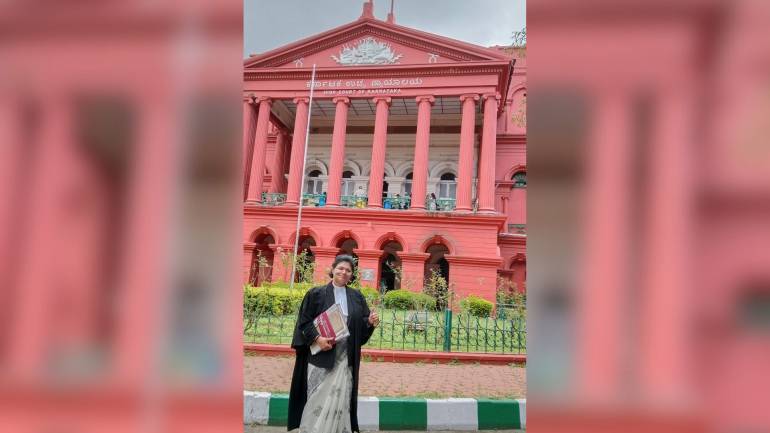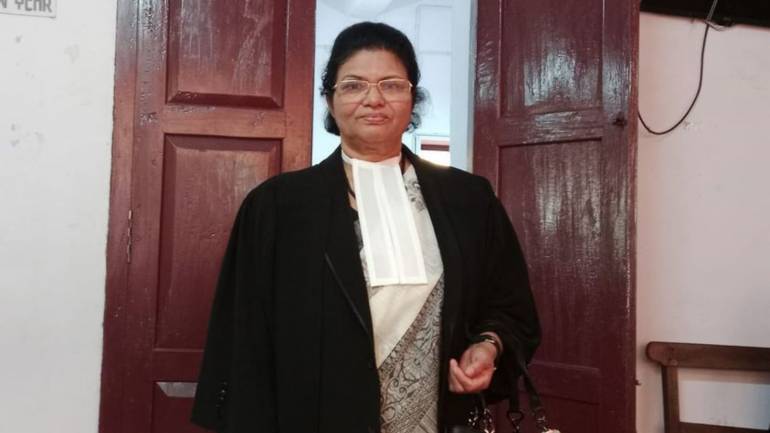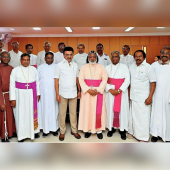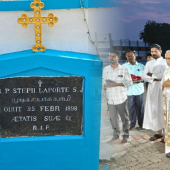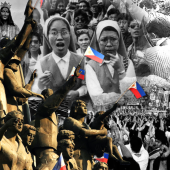An Indian nun amplifies the voices of the poor through her legal profession
Last October, Sister Jessy Kurian, a member of St. Anne's Providence, completed 18 years as a lawyer.
“These 18 years have been very great in my life, for during these years, I got ample opportunities to be with people and to work for them,” she said, adding, “I saw the misery of the people, heard the cries of the people, and acted as a voice of the voiceless many times.”
“The legal profession I passionately love is a way to serve the poor,” she says. “It is good that I decided to become a lawyer and help people.”
She is a well-known human rights activist whose mission is to aid Indian women who are suffering from unfair treatment by the law. Kurian was the first Indian Catholic nun to take a position that was kind of like being a lawyer.
She is a member of St. Anne's Providence of Secunderabad and the first person in her community to study law. She was a member of the National Commission for Minority Educational Institutions.
The former teacher is now a lawyer and works at the Supreme Court of India, New Delhi.
“The legal profession is a noble profession, but only when an advocate becomes the voice of the voiceless is it worth it,” she says.
Since she was a child, reading about the life of India's first woman judge, Anna Chandy, made Jessy want to become a lawyer. Jessy also wanted to become a nun and help people.
Her local priest told her that no convent would let a lawyer stay there.
“Thus, I chose to become a nun because I thought it would help me help other people, especially the poor and women,” she recalled. “God wanted me to be able to become a lawyer after 20 years in the convent. I've learned that a nun is a better way to help people than a lawyer after 30 years.”
As a nun, she witnessed people, mostly women, go through hard times. Over 20 years ago, she worked in many schools and colleges in Andhra Pradesh, in the southern part of India. She witnessed women suffering from abuse, domestic violence, the dowry system, and sexual harassment.
Two events made her decide to become a lawyer. She met a married female teacher for five years but didn't have any children. Jessy listened as the woman broke down in tears, sharing how her former mother-in-law had warned her on her first day at her husband's house that she would be sent back to her own house if her first child was a girl. They were afraid to try to have a child, so they never did.
The second was about a first-year female student at a college, where Jessy was a teacher. She used to be on campus late at night. What she told Jessy was that her father had been against her mother having a girl child from the time she was born. Everyone saw her mother as a curse. When her only child saw her in the house, her dad got mad. He had shifts at work. The girl only went home when he wasn't there. She would go to bed early when he was home at night.
These two cases shocked Jessy to learn that a woman couldn't give birth. It is not right for a girl to be born. Every woman is born with the ability to give birth. The mother-in-law didn't care about her being a woman. Jessy decided to teach people the rights they had because they were hurt by their lack of knowledge. So, Jessy decided to teach people the rights that are important to them.
Consequently, she quit her job as a director of a college in 2002 and then went to law school.
She began practicing law in 2005. Her first case was about domestic violence—acid killed a woman. Authorities caught and found three people guilty. They got seven years in prison. “I went to Delhi that same year after that case,” Jessy said.
“When I was younger, I thought a nun would be more helpful than a lawyer. However, I now realize that a nun lawyer can provide even greater assistance to individuals who are experiencing abuse. Because I'm a nun, my clients trust me. Now that I know more about the law, I can help people fight for their rights and keep them from being taken advantage of,” she said.
Today, she mostly deals with issues that affect women, like domestic violence, abuse, and the dowry system. However, some people might not like it when she fights for justice or points out wrongdoing. This kind of resistance and trouble only makes her stronger.
She also founded an NGO, Citizens Rights Trust, in 2011. Its members include lawyers who work for the Supreme Court, retired judges, social workers, law students, and people who care about helping others.
“We started it to support women's rights, legal education, legal help, and human rights. In different parts of India, especially in slums, we hold events to teach people about the law. We teach women, children, workers, low-caste and tribal people, and people of color about their rights. We also show them how to make a first information report (FIR) and help them find the right government departments to solve their problems,” she said.
In India, women suffer because men have narrow views. Patriarchy and men's perception that they are superior to women are the main causes of attacks on women. Not even religion is safe.
Men think they are better than other people, while women think they are weaker or less important.
Religion, family, society, and the government all need to work together to make this right.
Every religion should teach gender fairness and equality. Also, it should treat women the same and give them the same space. Granting women administrative, leadership, and decision-making roles will help to eliminate the perception of them solely as workers.
Parents should treat their sons and girls the same, give them the same chances to study and do other things, and teach them to respect women from a young age, said the nun.
Society needs to get rid of its male-centered mentality and see women as equal partners and workers, she said.
The government should ensure that subjects like gender justice and equality are taught in elementary school. Jessy emphasized the importance of teaching subjects like gender justice, equality, women's rights, basic rights, and human rights in schools.
Radio Veritas Asia (RVA), a media platform of the Catholic Church, aims to share Christ. RVA started in 1969 as a continental Catholic radio station to serve Asian countries in their respective local language, thus earning the tag “the Voice of Asian Christianity.” Responding to the emerging context, RVA embraced media platforms to connect with the global Asian audience via its 21 language websites and various social media platforms.





